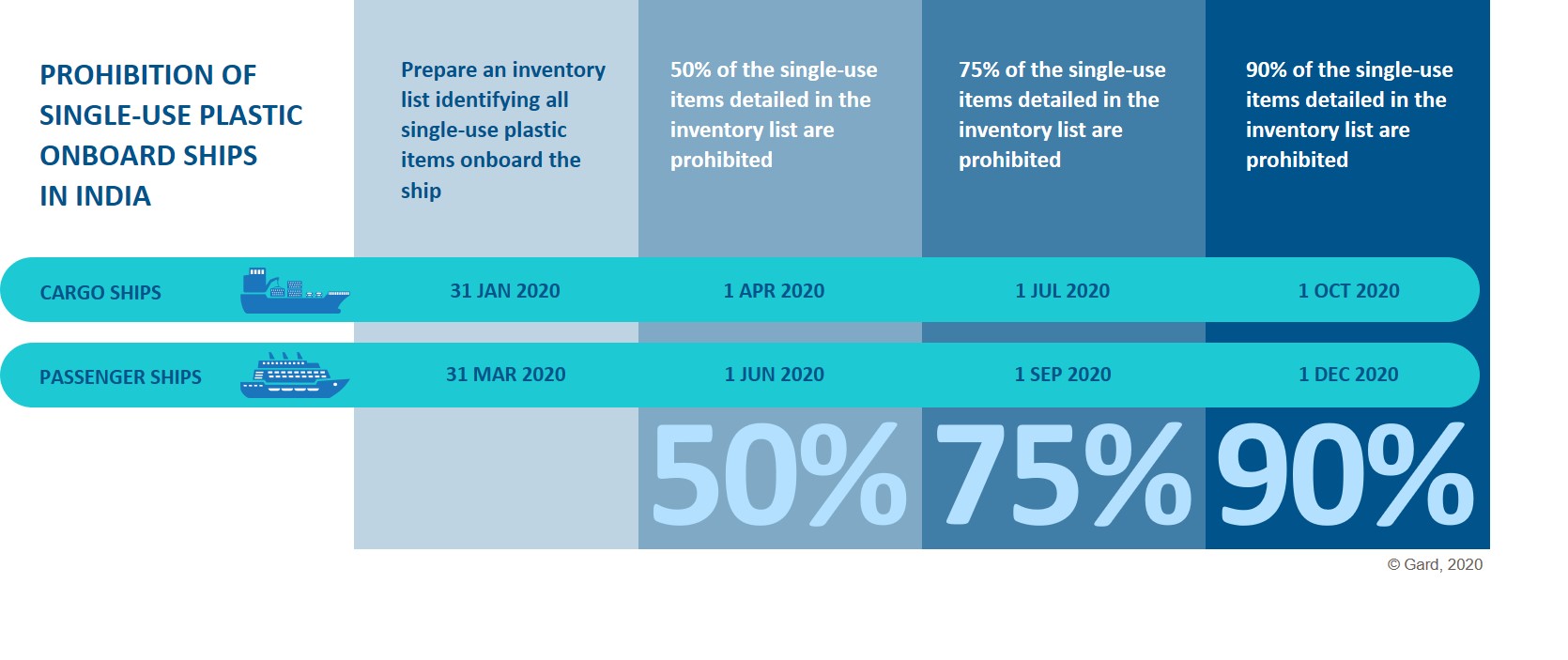Updated 7 February 2020
India aims to reduce ships’ use of single-use plastic by 90% during stays in Indian ports in the next 12 months.

Updated 7 February 2020
India aims to reduce ships’ use of single-use plastic by 90% during stays in Indian ports in the next 12 months.
Published 12 January 2020
On 16 October 2019, the Indian Directorate General of Shipping (DGS) issued Order No.05 of 2019 prohibiting the use of single-use plastic items onboard ships. The order prohibits the carriage of any such items onboard Indian flagged ships while foreign flagged ships are only prohibited from using any such item while at places or ports in India. Our alert “India bans single-use plastic onboard ships” of 24 October 2019 has the details.
While the initial plan was to implement the order in full by 1 January 2020, DGS later decided to postpone its implementation, to allow the shipping industry time to put in place the logistical arrangements needed to comply with the new requirements. DGS published a notice to that effect on 21 November 2019.
On 8 January 2020, DGS issued Addendum 1 to Order 5 of 2019 describing its new implementation strategy for the single-use plastic ban. In addition, a Frequently Asked Questions (FAQ) document has been published to explain the requirements in more detail. The following changes and clarifications to the original order should be noted:
Definition of single-use plastics
The original order defines single-use plastics as “disposable plastics which are used only once before they are thrown away”. The Addendum further clarifies that the prohibition applies only to such items used onboard ships and which are completely made of plastics. DGS provides the following examples of items not covered by the prohibition:
tetra pak cartons with plastic caps as used for milk and juice;
dispensers for liquids such as shampoo, cleaning products, etc. when these are repeatedly re-used/re-filled onboard and not discarded after single use;
items made of biodegradable plastic with a stamp, mark or certificate from the manufacturer or something similar;
cargo related items and packaging;
essential equipment such as personal protective equipment, medical equipment, lifesaving appliances and fire-fighting equipment; and
for the time being, crew and passenger personnel effects.
Please refer to the original order for a generic list of single-use plastic items covered by the prohibition.
New phase-out schedule
All ships are eventually required to reduce their single-use plastic use by 90% during stays in Indian ports. This will be achieved by a stepwise implementation of the prohibition and will be based on ship type and each ship’s actual inventory of single-use plastic items. To summarise:
All ships when at Indian ports or places must be able to present an inventory list identifying all single-use plastic items onboard that are covered by the prohibition. The deadline for establishing the inventory list is 31 January 2020 for cargo ships and 31 March 2020 for passenger ships.
An inventory list should identify the different types of single-use plastic items onboard but need not specify the actual number of each item onboard. As an example, the DGS explains that all plastic bags irrespective of size will be considered as one single-use plastic item.
For cargo ships, 50% of the items in the inventory list will be prohibited from 1 April 2020, 75% from 1 July 2020 and 90% from 1 October 2020.
Passenger ships are given two extra months to comply with each step of the phase-out schedule.
Ship operators are free to decide which items in the inventory list to place in each ‘phase-out category’ and can therefore prioritise based on each ship’s operational requirements and crews’ needs.
The DGS states that the inventory list, once prepared, should not be changed unless there is a need to correct the list.

Timeline
Demonstrating compliance
The original order prohibits the carriage of single-use plastic items onboard Indian flagged ships while foreign flagged ships are only prohibited from using any such item while at places or ports in India. Hence, in order for foreign flagged ships to demonstrate compliance, ships’ inventory lists should be developed into execution plans by sorting and categorizing all items in accordance with the applicable phase-out schedule. Execution plans must also describe ships’ procedures to ensure that the items prohibited from use at any given time will not be used during stays in Indian ports. In accordance with the original order, the prohibited items should be stored at identified locations while at places or ports in India.
INTERTANKO has recently published the “Guide to India’s Prohibition on the use of Single-Use Plastics and Best Practices for Management of Single-Use Plastics on Ships” which aims to help ship operators to identify prohibited items, develop proper record keeping and identify possible solutions to reduce the amount of single-use plastics onboard ships. A copy of the guide can be found here: https://www.intertanko.com/search-article/articleview/india-sup-prohib. We are grateful to INTERTANKO for their kind permission to reproduce the document.
For foreign ships that have not prepared the required inventory list, Indian authorities will use the generic list of single-use plastic items as included in the original order and apply the same phase-out schedule.
The revised FAQ document clarifies that the prohibition does not apply to ships passing through Indian territorial waters.
Waste reception facilities
India will still permit single-use plastic items to be discharged to its port reception facilities but emphasizes that such items should be segregated from other wastes and marked accordingly. Remember – under MARPOL Annex V, all plastic waste generated during the normal operation of the ship is strictly banned from discharge in any waters!
See also our alert “Kuwait joins India in ban on single-use plastic onboard ships” of 5 December 2019.